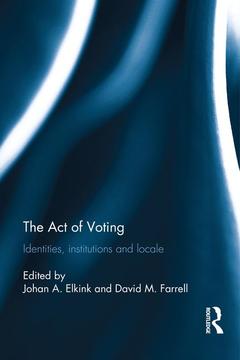The Act of Voting Identities, Institutions and Locale
Coordonnateurs : Elkink Johan A., Farrell David M.

Electoral behaviour is one of the most dynamic areas of study in the field of comparative politics today. A strongly emerging theme in recent years has been the need to set the study of voting behaviour in its wider context, that is to understand how the behaviour of the individual (non)voter is conditioned by the environment in which the election is occurring. The main motivation for this book is to respond to this need.
The Act of Voting examines voting ? both the question of whether to vote (ie. electoral turnout) and who to vote for ? in context from a range of interdisciplinary perspectives. In addition to other topics and themes, chapters explore the national or social identities of individuals and how these contribute to complex social dynamics, discuss the institutions that determine who is able to vote and over what, and analyse the impact of the locale on the voting act.
Offering chapters by up-and-coming scholars in the field of electoral behaviour, as well as reflections on how the act of voting should be viewed in the broadest context ? normatively, institutionally and socially, this book will be of interest to students and scholars researching political behaviour, public opinion and politics more generally.
The Act of Voting: Identities, Institutions and Locale 2. European Identities in Comparative Perspective 3. Does Ulster Still Say ‘No’? Public Opinion and the Future of Northern Ireland 4. Transnational Citizenship and Access to Electoral Rights: Defining the Demos in European States 5. Electoral Processes and Presidential Elections in ‘Presidential Republics’ 6. EU Treaty Referendums in Ireland and Denmark: A Comparative Analysis of Different Conceptions of Sovereignty and their Democratic Implications 7. Confronting Europe: the Irish Referendums on Lisbon 8. Locality in Irish Voter Preferences 9. Candidates, Parties and Constituency Relations: A Study in Irish Clientelism 10. Exploring the Non-Alignment of Party and Candidate Assessments in Ireland: Do Voters Really Follow Candidates? 11. Intention to Vote, Reported Vote, and Validated Vote 12. Political Inequality in Second Order Elections: Resources, Campaign Mobilization and Voter Turnout 13. Religion, Electoral Participation and Party Support in Northern Ireland 14. Identity Formation and Political Generations: Age, Cohort, and Period Effects in Irish Elections 15. The Act of Voting in Context
Johan A. Elkink is a lecturer at University College Dublin.He works on the international diffusion of democracy, institutionalisation and personalisation of the Russian regime, voting behaviour in referendums, and the estimation of spatial econometric models.
David M. Farrell is Professor of Politics at University College Dublin. He is a leading expert in the study of parties and elections.
Date de parution : 10-2015
15.6x23.4 cm
Date de parution : 06-2017
15.6x23.4 cm
Thème de The Act of Voting :
Mots-clés :
Elections; Electoral behaviour; Europeanness; Identities; Locale; Political Behavior; Political Parties; Voter; Voting; campaign; identity; referendums; David M; Farrell; Anthony F; Heath; Thees Spreckelsen; John Coakley; Iseult Honohan; Derek Hutcheson; Jean Blondel; Palle Svensson; Brigid Laffan; Michael O'Kelly; Søren Risbjerg Thomsen; Jane Suiter; Michael Marsh; Laura Maria Schwirz; Christopher H; Achen; André Blais; Susan Banducci; Bernadette C; Hayes; Ian McAllister; Stephen Quinlan; Northern Ireland Social Attitudes Surveys; SDLP; External Vote; Irish National Election Studies; West Germany; EU Election; Direct Democracy; Recent Irish Elections; Celtic Cub; Irish Voting Behaviour; Ulster Unionist Party; Fiscal Compact Treaty; EP Election; Intra-party Transfers; Resident Non-citizens; Fine Gael; EU Member State; Non-resident Citizens; Lisbon Referendum; RoI; Ane Data; Lisbon Treaty Referendums; Lower Preference Votes; EU Treaty



